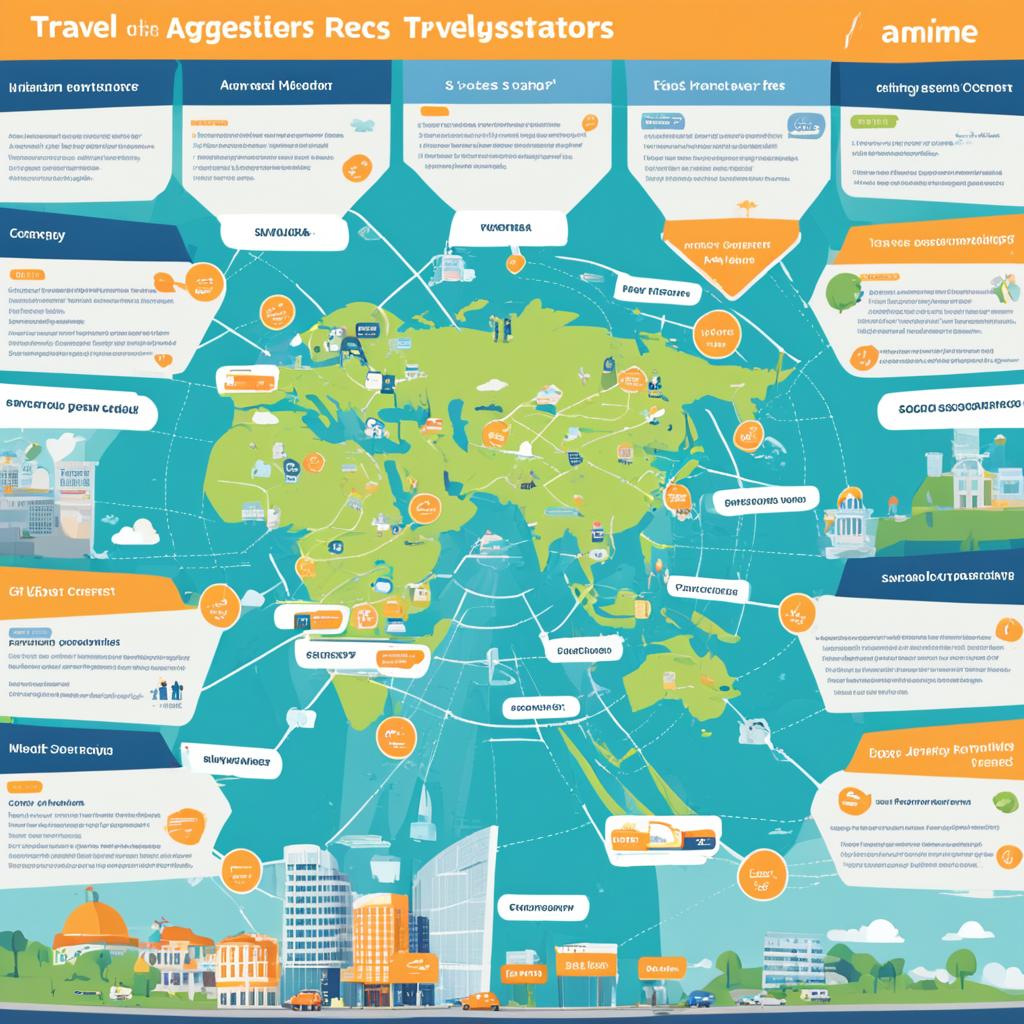Have you ever wondered how travel aggregators simplify trip planning, allowing you to compare deals on flights, hotels, and car rentals all in one place? These platforms, such as Skyscanner, Adioso, and Google Flights, have revolutionized the way we search for and book travel options, making the process more efficient and convenient.
But what exactly do travel aggregators do, and how do they help travelers find the best deals? In this article, we’ll explore the world of travel aggregators and delve into the benefits they offer, the revenue sources that fuel their operations, how they are built, and the future trends that will shape their evolution.
So, are you ready to uncover the secrets behind these travel booking platforms? Let’s dive in!
The Benefits of Using a Travel Aggregator Website

When planning your next trip, using a travel aggregator website can bring you numerous benefits that will save you both time and money. These platforms offer a convenient way to compare multiple options in one place, eliminating the need to visit individual websites and navigate through countless tabs. By leveraging the power of travel aggregators, you gain access to a wide range of airlines, hotels, and car rental companies, providing you with an extensive selection.
Travel aggregator websites often offer exclusive deals and discounts, allowing you to find cheaper options that may not be available elsewhere. Imagine being able to access these special offers all in one location, enabling you to make significant savings on your travel expenses. Additionally, these platforms provide features like price alerts and flexible date searches to help you find the best prices and deals that align with your travel dates and preferences.
By using a travel aggregator, you streamline the entire booking process, making it more efficient and hassle-free. Whether you’re searching for flights, hotels, or car rentals, you can find all the options you need in a single search. This saves you valuable time that you can better spend on other aspects of your trip planning.
Furthermore, the convenience of having access to multiple options at competitive prices means that you can make informed decisions based on your preferences. You have the freedom to choose the best flights, accommodations, and transportation options that meet your specific needs and budget.
Overall, utilizing a travel aggregator website not only simplifies the booking process but also opens up possibilities for significant cost savings. By consolidating everything in one place, you’ll have a comprehensive view of the available options, exclusive deals, and the ability to customize your travel plans easily.
Key Benefits of Using a Travel Aggregator Website:
- Save time by searching for multiple travel options in one place.
- Access exclusive deals and discounts not available elsewhere.
- Choose from a wide range of airlines, hotels, and car rental companies.
- Utilize features like price alerts and flexible date searches to find the best prices and deals.
- Simplify the booking process and make informed decisions.
- Potential for significant cost savings.
How Do Travel Aggregators Make Money?

Travel aggregators generate revenue through various sources. One of the main sources is affiliate sales, where they earn a commission for each booking made through their platform. Aggregators partner with airlines, hotels, and car rental companies, and when a user books a flight, hotel, or car rental through their platform, the aggregator earns a commission from the service provider.
Another source of revenue is advertising. Aggregators display ads on their websites and mobile apps, and they earn revenue from advertisers who pay to display their ads to users.
Additionally, aggregators may receive commissions from bookings made through their platform. For example, if a hotel offers 10 rooms to an aggregator for online reservation, the aggregator pays the hotel a discounted rate per room and keeps a portion of the amount paid by the customer as commission.
These revenue sources allow travel aggregators to offer their services for free to users while generating income for their operations.
| Revenue Sources | Description |
|---|---|
| Affiliate Sales | Earn commissions for bookings made through their platform. |
| Advertising | Earn revenue from displaying ads on their websites and mobile apps. |
| Commissions from Bookings | Earn commissions from bookings made through their platform. |
How to Build a Travel Aggregator Website

Building a travel aggregator website requires a few essential components. First, you need a content management system (CMS) that serves as the framework for your website. A CMS helps you manage and organize the content on your site, making it easier to update and maintain.
Next, you’ll need a good front-end design that matches your aesthetic and user experience goals. This includes creating a user-friendly interface, incorporating visually appealing elements, and ensuring seamless navigation. A well-designed front-end enhances the user experience and keeps visitors engaged.
Additionally, you’ll need an engine to retrieve data from APIs provided by other travel websites. API integration is crucial for a travel aggregator as it allows you to gather information on flights, hotels, and car rentals from various sources and present it on your website. This integration ensures that your platform provides comprehensive and up-to-date travel options.
You have two main options for building your travel aggregator website. You can either build it from scratch or use readily available scripts and plugins provided by platforms like WordPress or specialized travel website development companies. Both options have their pros and cons, so consider factors such as flexibility, cost, and time required when making your decision.
Building from Scratch
Building your website from scratch gives you complete control over every aspect of its development. You can customize the CMS, front-end design, and API integration according to your specific requirements. However, this approach can be more time-consuming and technically challenging, requiring a team of skilled developers.
Using Ready-Made Solutions
Using ready-made solutions, such as WordPress or travel website development companies, can significantly speed up the process. These platforms provide pre-built CMS templates, front-end designs, and API integration plugins specifically tailored for travel aggregators. This option is more cost-effective and requires fewer technical skills compared to building from scratch.
Whichever approach you choose, remember to prioritize a user-friendly interface, responsive design, and seamless API integration to deliver a superior user experience. Building an efficient and visually appealing travel aggregator website will attract more users and enhance their overall travel planning experience.
The Future of Travel Aggregators
The future of travel aggregators is set to revolutionize the way we plan and book our trips. Personalized recommendations and AI integration are key trends that will shape the industry in the coming years.
As technology advances, travel aggregators will utilize customer data and preferences to offer personalized recommendations for flights, hotels, and activities. By leveraging this information, aggregators can provide tailored travel options based on individual preferences and past booking history. This level of personalization enhances the user experience and makes the trip planning process more efficient and enjoyable.
Furthermore, AI integration will play a pivotal role in streamlining the booking process and improving customer service. Aggregators will employ AI-powered chatbots to assist users in finding the best deals, answering queries, and providing real-time support. These chatbots will ensure that travelers receive prompt and accurate assistance throughout their booking journey.
Additionally, AI algorithms will analyze trends and patterns to predict future travel trends. This foresight will enable travel aggregators to offer proactive recommendations and optimize pricing strategies. By leveraging AI technology, aggregators can anticipate customer needs and provide personalized offers that cater to their unique preferences and budget.
In conclusion, the future of travel aggregators lies in the seamless integration of AI and personalized recommendations. By harnessing the power of data and leveraging AI technology, aggregators will create a more tailored and user-centric travel booking experience. With advancements in technology, travelers can look forward to a more efficient and personalized way to plan their trips.
FAQ
Q: What do travel aggregators do?
A: Travel aggregators are platforms that search for deals across multiple websites and present the results in one place. They simplify the trip planning process by allowing travelers to compare deals on flights, hotels, and car rentals all in one search.
Q: What are the benefits of using a travel aggregator website?
A: Using a travel aggregator website saves time and money by allowing travelers to search for multiple options in one place. These platforms also offer exclusive deals and discounts, provide access to a wide range of options, and offer features such as price alerts and flexible date searches.
Q: How do travel aggregators make money?
A: Travel aggregators generate revenue through affiliate sales, advertising, and commissions from bookings made through their platforms. They partner with travel service providers and earn commissions whenever a user makes a booking. They also display ads and receive commissions from bookings.
Q: How can I build a travel aggregator website?
A: To build a travel aggregator website, you need a content management system (CMS), a good front-end design, and an engine to retrieve data from APIs provided by other travel websites. You can choose to build your website from scratch or use readily available scripts and plugins.
Q: What is the future of travel aggregators?
A: The future of travel aggregators will focus on personalized recommendations and AI integration. Aggregators will use customer data to provide tailored travel options, and AI technology will enhance the booking process and customer service.
